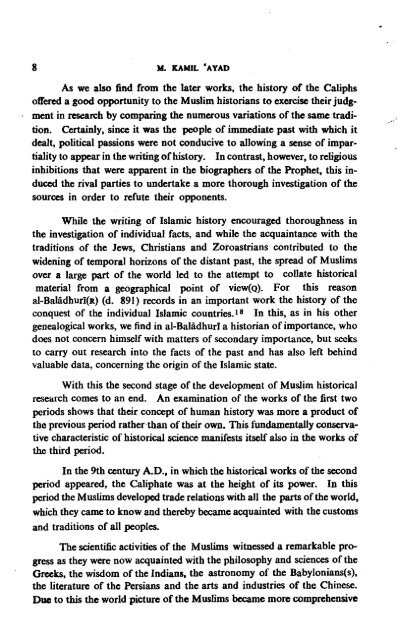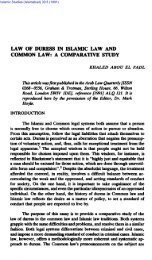THE BEGINNING OF MUSLIM HISTORICAL RESEARCH*
THE BEGINNING OF MUSLIM HISTORICAL RESEARCH*
THE BEGINNING OF MUSLIM HISTORICAL RESEARCH*
Create successful ePaper yourself
Turn your PDF publications into a flip-book with our unique Google optimized e-Paper software.
As we also find from the later works, the history of the Caliphs<br />
offered a good opportunity to the Muslim historians to exercise their judg-<br />
- ment in march by comparing the numerous variations of the same tradi-<br />
tion. Certainly, since it was the people of immediate past with which it<br />
dealt, political passions were not conducive to allowing a sense of impar-<br />
tiality to appear in the writing of history. In contrast, however, to religious<br />
inhibitions that were apparent in the biographers of the Prophet, this in-<br />
duced the rival parties to undertake a more thorough investigation of the<br />
sources in order to refute their opponents.<br />
While the writing of Islamic history encouraged thoroughness in<br />
the investigation of individual facts, and while the acquaintance with the<br />
traditions of the Jews, Christians and Zoroastrians contributed to the<br />
widening of temporal horizons of the distant past, the spread of Muslims<br />
over a large part of the world led to the attempt to collate historical<br />
material from a geographical point of view(q). For this reason<br />
al-Balldhuri(~) (d. 891) records in an important work the history of the<br />
conquest of the individual Islamic countries.18 In this, as in his other<br />
genealogical works, we find in al-Balldhuri a historian of importance, who<br />
does not concern himself with matters of secondary importance, but seeks<br />
to carry out research into the facts of the past and has also left behind<br />
valuable data, concerning the origin of the Islamic state.<br />
With this the second stage of the development of Muslim historical<br />
resedrch comes to an end. An examination of the works of the first two<br />
periods shows that their concept of human history was more a product of<br />
the previous period rather than of their own. This fundamentally conserva-<br />
tive characteristic of historical science manifests itself also in the works of<br />
the third period.<br />
In the 9th century A.D., in which the historical works of the second<br />
period appeared, the Caliphate was at the height of its power. In this<br />
period the Muslims developed trade relations with all the parts of the world,<br />
which they came to know and thereby became acquainted with the customs<br />
and traditions of all peoples.<br />
The scientific activities of the Muslims witnessed a remarkable pro-<br />
gress as they were now acquainted with the philosophy and sciences of the<br />
Greeks, the wisdom of the Indians, the astronomy of the Babylonians(s),<br />
the literature of the Persians and the arts and industries of the Chinese.<br />
Due to this the world picture of the Muslims became more comprehensive
















